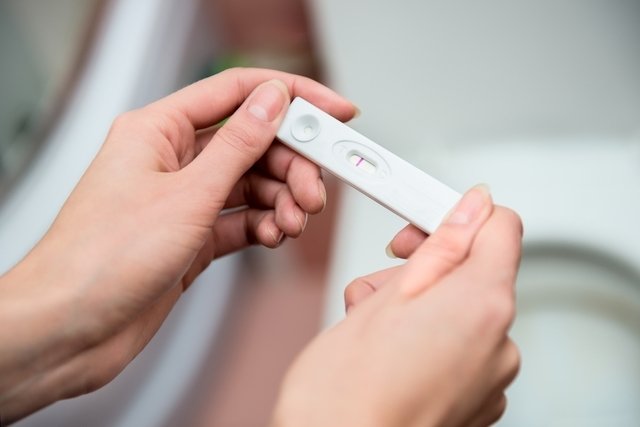To know if you are pregnant, you need to pay attention to signs and symptoms that appear in the first weeks of pregnancy, such as delayed menstruation, abdominal discomfort, pinkish discharge, nausea, increased urge to urinate and breast sensitivity, for example.
Next, it is important that tests are carried out to help confirm the pregnancy. Initially, you can take a pharmacy test, which can be done 7 days after unprotected intercourse or after the first day of a missed period. However, confirmation is usually done through a blood test, which indicates the amount of beta-hCG hormone circulating in the body, which allows the doctor to identify the week of pregnancy.
After confirming the pregnancy, it is important that the gynecologist and/or obstetrician’s instructions are followed to ensure that the pregnancy occurs in a healthy way for the woman and to guarantee the baby’s development.

Main symptoms
Initially, it is possible to suspect pregnancy through some signs and symptoms, such as:
- Delay in menstruation;
- Nausea and vomiting in the morning;
- Increased urge to urinate;
- Tiredness and a lot of sleep during the day;
- Increased sensitivity in the breasts;
- Small pinkish discharge;
- Mild abdominal discomfort, similar to colic.
Check out a list of the 18 first symptoms of pregnancy.
Online pregnancy test
Take the following test and find out your chances of being pregnant:
Is it possible to be pregnant even without symptoms?
In many cases, it can take a woman up to 2 or 3 months to identify any symptoms of pregnancy. This is because many of the signs can be difficult to identify and their intensity can vary according to each woman.
Furthermore, although it is rarer, there are also women who may not show any symptoms throughout their pregnancy, only discovering that they are pregnant at the time of delivery. Find out more about pregnancy without symptoms and the risks.
How to confirm pregnancy
Initially, it is possible to confirm pregnancy through tests that can be carried out after a delay in menstruation, such as a urine test and a blood test:
- Urine tests: It can be purchased at the pharmacy and the woman can do it at home with her first morning urine. If the test is negative and your period continues to be late, the test must be repeated 5 days later. If the second pregnancy test is still negative and your period continues to be late, it is recommended to make an appointment with a gynecologist to investigate the situation. However, if the test is positive, you should take a blood test to confirm the pregnancy.
- Blood test: This test is carried out in a laboratory and detects the amount of the hormone HCG in the blood, which is released by the placenta at the beginning of pregnancy.
Thus, based on the test results, it is possible to confirm the pregnancy and start prenatal care according to the doctor’s instructions. See how prenatal care is done.
Is it possible to be pregnant even when the test is negative?
Current pregnancy tests are quite sensitive and, therefore, the result is usually quite reliable, as long as the test is done at the right time. However, as some women may produce few hormones at the beginning of pregnancy, the result may be false negative, especially in the case of the urine test. Therefore, when the result is negative, it is recommended to repeat the test 5 to 7 days after the first.
Learn more about when a false negative pregnancy result can happen.
Who is most at risk of getting pregnant
When a woman has a regular menstrual cycle, lasting approximately 28 days, she has a greater chance of getting pregnant when she is in the fertile period, which normally corresponds to the 2 days before and after ovulation and, which normally happens around the 14th day, the from the first day of menstruation. Use our calculator to find out your fertile period.
Women who have an irregular cycle, which can be shorter or longer, cannot calculate the fertile period as accurately and, therefore, the risk of getting pregnant is greater throughout the cycle.
Although there is a greater risk of becoming pregnant in the days close to the day of ovulation, a woman can also become pregnant if she has had unprotected intercourse up to 7 days before ovulation, as sperm can live inside the woman’s vagina for 5 to 7 days. , being able to fertilize the egg when it is released.
Bibliography
- UPTODATE. Clinical manifestations and diagnosis of early pregnancy. 2019. Disponível em: <https://www.uptodate.com/contents/clinical-manifestations-and-diagnosis-of-early-pregnancy>. Acesso em 31 mar 2020
- SAYLEA, Amy E. et al. A prospective study of the onset of symptoms of pregnancy. Journal of Clinical Epidemiology. Vol.55, n.2012. 676-680, 2002
- NATIONAL INSTITUTES OF HEALTH. What are some common signs of pregnancy?. 2017. Disponível em: <https://www.nichd.nih.gov/health/topics/pregnancy/conditioninfo/signs>. Acesso em 27 nov 2019

Sign up for our newsletter and stay up to date with exclusive news
that can transform your routine!
Warning: Undefined array key "title" in /home/storelat/public_html/wp-content/plugins/link-whisper-premium/templates/frontend/related-posts.php on line 12
Warning: Undefined array key "title_tag" in /home/storelat/public_html/wp-content/plugins/link-whisper-premium/templates/frontend/related-posts.php on line 13




